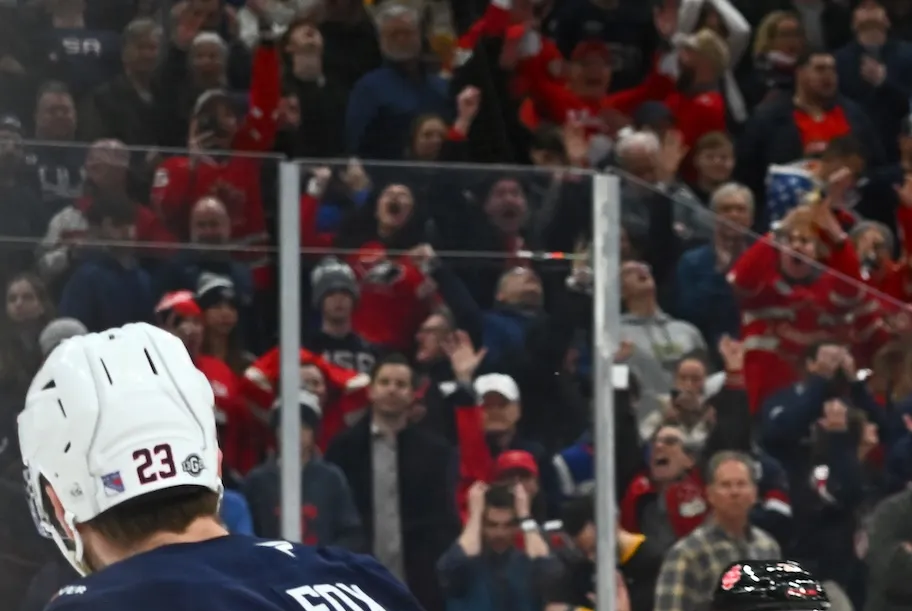The only thing wrong about Canada’s 3-2 overtime triumph over the United States in Thursday’s 4 Nations title game is that there was only one extra period, and that lasted under 500 seconds. By rights, it could have, nay, should have lasted past midnight in the east, with every subsequent overtime as high-octane as the first.
Other than that, it could not have been much better as entertainment, as long as you accept the fact that there was an annoying level of contrivance to it. The country that cares most about hockey won, the game’s most recognizable player, Connor McDavid, scored the winning goal, the game’s disputably best player, Nathan MacKinnon, was named the most valuable player, and the goaltender who stole the show, Jordan Binnington, fully resuscitated the reputation as a big-game player he last enjoyed six years ago.
And suddenly, hockey is having one of its occasional moments. The tournament was a grand success at a time when the NBA’s All-Star Weekend was so drab and awful that the only competition was to see who could hate it most and loudest. The U.S. and Canada are finally viewed from the outside as the truest of archrivals, replacing the long-dormant U.S.-Russia as the game’s international tentpole. The mood for fighting in the game, powered by the truculently irksome yet unquestionably talented Tkachuks, is suddenly spiking upward. Even the national anthem is a thing worthy of notice again, after decades of acceptance that the Canadian anthem kicks all the musical ass there is, in part because it is the world’s fifth-shortest.
Nothing good comes without sales tax and onerous payment plans, though, and the cost of all this fun is an obnoxious level of jingoism powered in considerable part by the nimrod in Washington who thinks his voting base has had a simmering hate-on for Canada that has finally found its voice. It took Matthew Tkachuk and former NHLer turned ESPN mega-bore P.K. Subban endorsing the president to make it all the more irritating, though in both cases it seemed less like true believers and more like cynical hucksterism designed to find the mood of the nation’s amorphous audience. Even ESPN’s repeated references to the movie Miracle, most irritatingly Kurt Russell’s speech before the Russia game, were hamhanded because the network too senses that there is a newfound audience for ham.
It should be noted here that none of this would have been possible if William Nylander had scored the overtime goal in the tournament’s first game instead of his Maple Leafs linemate Mitch Marner. Sweden would have beaten Canada, the impetus for the U.S.-Canada game and its three-fights-in-nine-seconds intro would have been gone, and a Sweden-U.S. final would not have energized this nation nearly so shamelessly. Nobody is recording how Fennoscandia is handling the tournament because, well, in our epic levels of self-absorption, we never do, do we?
Nor would the view of the tournament have been possible if the NBA wasn’t so busy unclogging its nostrils on its own shirtfronts. Not just by saying that the All-Star Weekend is a total suckfest, mind you, but by proving it. The reasons are many, as is usually the case in such entertainment catastrophes, but the custodians of the game both in uniform and suit have mistreated that event to the point where it is now a touchstone in ways that even the still-vibrating Luka Doncic trade cannot match. Thus there was a vacuum, and 4 Nations, or at least the two local nations, filled it nicely.
All that said, the game was an extended highlight film played with pace and purpose throughout, and the players had the great good sense to play to win rather than harm. There was one lone penalty the entire night, an innocuous trip by veteran Vincent Trocheck, and the rest of it was a triumph of efficiency at speed. The U.S. was the better side in terms of play, but the other beauty of sudden-death hockey is that while the team with the best goalie doesn’t always win, the goalie with the best game always does. Binnington, the St. Louis Blue with the reputation for big moments interspersed with maddeningly soft goals, robbed the Americans time and again, most clearly in the late minutes of the third period and overtime, when the Boston ice seemed impossibly tilted his way. It was the most Canadian of ways to win, and with the central casting denouement by that stereotypically most Canadian of players, McDavid.
If only he had waited another hour or two or even three to deliver. A four-overtime game is always its own tension-building reward, a zenith of what the game’s ethos of dogged persistence regardless of phonied-up geopolitical concerns, no matter what the I-wanna-go-to-bed softspines would have you believe. Whether hockey can consolidate its gains of the last nine days into something more marketable relies heavily on America overcoming its minimal and ever-shrinking attention span, and that’s Gary Bettman’s problem anyway. What we know is, last night all the right things happened the way they should, pandering and opportunism be damned. Including the needless parting salvo from the outgoing Canadian premier.


